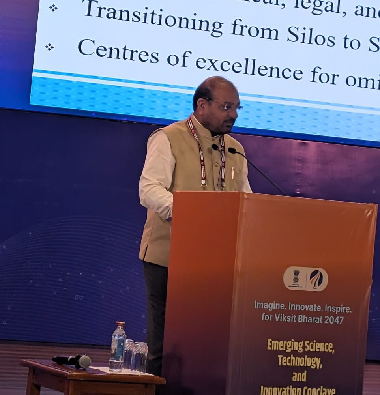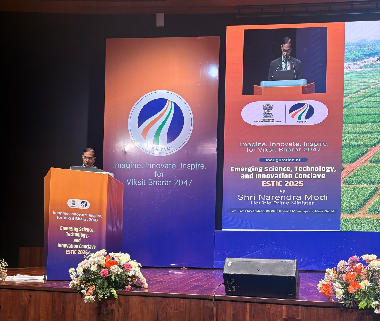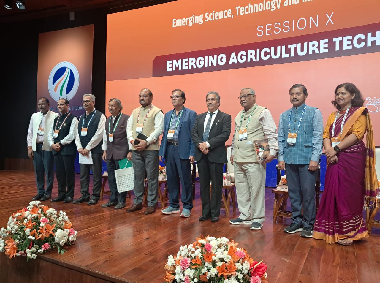5 November 2025, New Delhi
The Indian Council of Agricultural Research led the thematic session on ‘Emerging Agricultural Technologies’ at the Emerging Science, Technology and Innovation Conclave (ESTIC) 2025, held today at Bharat Mandapam, New Delhi. The session highlighted frontier domains such as precision agriculture, omics research, and farm automation, showcasing innovations that are shaping the future of Indian agriculture.
The session was chaired by Dr. M. L. Jat, Secretary (DARE) and Director General (ICAR), while the keynote address was delivered by Dr. Trilochan Mohapatra, Chairperson, Protection of Plant Varieties and Farmers’ Rights Authority (PPV&FRA), and former Secretary (DARE) & Director General (ICAR).

A panel discussion on the theme ‘Transforming Indian Agriculture through Precision, Omics, and Automation: Pathways to Viksit Bharat 2047’ was moderated by Dr. Shyam Narayan Jha, Deputy Director General (Agricultural Engineering) ICAR.
Eminent experts including Dr. Usha Barwale Zehr, Executive Director & Chairperson, Grow Indigo Pvt. Ltd., Maharashtra; Shri Sachin Hegdekudgi, Founder & CEO, Roots Goods, Bengaluru; Dr. Nachiket Kotwaliwale, Director, ICAR–Central Institute of Post-Harvest Engineering and Technology, Ludhiana; Prof. Santanu Chaudhury, IIT Delhi and former Director, IIT Jodhpur; Prof. K. C. Bansal, former Director, ICAR–National Bureau of Plant Genetic Resources; Dr. A. Bandyopadhyay, former ADG & Director, NRC Grapes; and Mr. Abhilash Sethi, Investment Director, Omnivore, Bengaluru, participated in the deliberations.
Key Recommrndations:
•Shift from silo-based approaches to integrated, system-level solutions ensuring sustainability and cross-sectoral synergy.
•Advance omics research and synthetic biology for next-generation agriculture focused on nutrition and health.
•Promote precision agriculture, mechanization, and automation tailored for small and marginal farmers.
•Harness digital and data-driven agriculture to strengthen local food systems and enhance agrobiodiversity.
•Integrate sensors and cognitive computing to improve quality assurance and food safety across value chains.
•Encourage green energy farming and the development of efficient storage technologies.
•Establish integrated agri-tech innovation ecosystems and capacity-building platforms linking public institutions, private enterprises, start-ups, and FPOs.
•Develop ethical, legal, and social safeguards for synthetic biology and agricultural data governance.
•Create a Sustainable Food System Fund to enable system-wide transitions for sustainability.
•Set up Centres of Excellence in omics, agricultural robotics, and artificial intelligence to drive innovation-led growth.

Emerging Agricultural Technologies: Paving the Way Forward
Emerging agricultural technologies are transforming the landscape of food production, making farming more efficient, sustainable, and resilient. Innovations in precision agriculture, omics-based research, automation, artificial intelligence, remote sensing, and digital platforms are enabling data-driven decision-making and optimizing resource use. Advances in synthetic biology, agri-robotics, IoT-enabled farming systems, and green energy solutions are redefining modern agriculture enhancing crop management, improving soil health, and reducing environmental footprints. These innovations empower farmers, particularly small and marginal holders, while strengthening food security, value addition, and traceability across the agri-food value chain.
The Emerging Science, Technology and Innovation Conclave (ESTIC) serves as a premier platform for researchers, policymakers, entrepreneurs, and innovators to engage in dialogue on frontier developments shaping the nation’s scientific and technological future. The event showcases breakthroughs in areas such as artificial intelligence, biotechnology, nanotechnology, renewable energy, space science, and digital transformation.

By fostering collaboration among academia, industry, and government, the conclave reinforces India’s commitment to science-led growth and aligns with national missions including Atmanirbhar Bharat, Digital India, and the Science, Technology and Innovation Policy (STIP). It also inspires young scientists and startups to contribute toward building a knowledge-based, technology-driven economy for a Viksit Bharat.
The conclave drew 1,339 registered participants from across the country, representing academia, research institutions, industry, and start-ups. The discussions underscored the need for integrated innovation ecosystems and the ethical deployment of advanced technologies to achieve the vision of Viksit Bharat 2047.







फेसबुक पर लाइक करें
यूट्यूब पर सदस्यता लें
X पर फॉलो करना X
इंस्टाग्राम पर लाइक करें